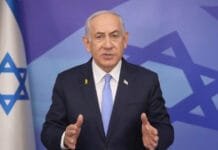INVC NEWS
Middle East – : Iran has forcefully denied claims made by President Donald Trump regarding a so-called “Complete and Total” ceasefire with Israel. According to Iranian officials, no formal ceasefire has been agreed upon, and Supreme Leader Ayatollah Ali Khamenei has dismissed any notion of compromise, asserting that justice takes precedence over diplomacy.
Khamenei Breaks Silence: “Justice Before Deals”
In a statement released by Iran’s state-run media, Ayatollah Khamenei declared that Iran has not agreed to any ceasefire with Israel and criticized Western media for spreading “fabricated narratives.” He emphasized that the Islamic Republic will not trade martyrs and sovereignty for political settlements.
“We do not make deals with oppressors,” Khamenei said during a high-level meeting with the Revolutionary Guard. “Justice comes before ceasefires. Blood spilled shall not be washed away by diplomatic ink.”
Contradicting the Trump Announcement
President Trump had earlier announced via Truth Social that Israel and Iran would enter a 24-hour phased ceasefire, with Iran beginning the halt at midnight ET, followed by Israel twelve hours later.
Iranian officials, however, say this statement is entirely baseless, accusing the U.S. of spreading disinformation to cover military setbacks and domestic political pressure. A senior Iranian Foreign Ministry spokesperson said, “There has been no negotiation, no agreement, and no ceasefire. Iran does not take orders from Washington.”
Continued Hostilities on the Ground
Despite Trump’s announcement, reports from Tehran, Damascus, and southern Lebanon indicate that Iranian-linked militias and Israeli defense forces remain actively engaged. Rocket fire and airstrikes were exchanged overnight in border zones, contradicting any claims of de-escalation.
Field reporters in Syria and Iraq confirmed that IRGC-backed units continue to mobilize and reinforce positions near Golan Heights and the outskirts of Baghdad. Israeli forces have maintained a state of high alert, with missile defense systems still activated in Tel Aviv and Haifa.
No Compromise from the Supreme Leader
Ayatollah Khamenei’s unwavering stance reflects a deep ideological resistance to any Western-brokered ceasefire, particularly when the blood of senior Iranian generals has not been accounted for.
Khamenei also expressed disdain toward internal voices pushing for negotiation. “Those within our borders who echo the enemy’s tone must reflect on who they serve,” he warned, in a thinly veiled rebuke to moderates within Iran’s government.
Iranian Public Rallies Behind Resistance
Following Khamenei’s statement, thousands of Iranians took to the streets in Tehran, Qom, and Isfahan in state-sanctioned rallies, chanting anti-Israel and anti-America slogans, and voicing support for continued “resistance until justice is served.”
Placards reading “No Peace Without Vengeance” and “Blood Demands Accountability” were widely displayed. These rallies appear to signal that Iran’s political elite has no immediate intention of standing down militarily or diplomatically.
International Reaction: Confusion and Concern
Global powers have responded with caution and concern over the conflicting narratives. The United Nations, European Union, and Gulf Cooperation Council have called for clarity and restraint from both sides.
UN Secretary-General António Guterres urged “urgent verification of facts” and called for “immediate de-escalation to avoid a catastrophic spiral.”
Russia expressed skepticism over Trump’s announcement, citing lack of confirmation from Iranian or Israeli leadership.
China urged “maximum restraint” and said it was prepared to mediate talks, but acknowledged the situation remains “volatile and unpredictable.”
What Lies Ahead? Escalation or Diplomacy
With the ceasefire now officially rejected by Iran’s highest authority, the path forward appears fraught with tension:
Israel is unlikely to pause strikes unilaterally, especially amid ongoing rocket fire and Iranian mobilization.
Iran’s Revolutionary Guard Corps (IRGC) is reportedly seeking regional reinforcements, raising fears of proxy escalations in Lebanon, Iraq, and Syria.
U.S. forces stationed in Qatar and Bahrain remain on high alert, despite no immediate response from Iran following their missile salvo earlier this week.
Iran’s Position: Negotiation Is Not Appeasement
Iranian analysts argue that the rejection of the ceasefire is not merely defiance—it’s a calculated message. Tehran believes accepting a U.S.-announced ceasefire without acknowledgment of Iranian conditions would be tantamount to surrender.
Dr. Farshad Rahimi, a Tehran-based foreign policy scholar, notes:
“Khamenei is signaling that Iran’s red lines are not negotiable. Nuclear scientists, generals, and national pride have been attacked. There can be no talks until accountability is ensured.”
Misinformation or Miscalculation?
As the fog of war thickens, the stark contradiction between Washington’s declaration of peace and Tehran’s fiery denial has left the international community on edge.
Whether Trump’s announcement was based on bad intelligence, wishful thinking, or a strategic misdirection, the ground reality makes one thing clear: Iran is not ready to talk peace.
Until then, the region braces for what could be another deadly phase of retaliation.
















